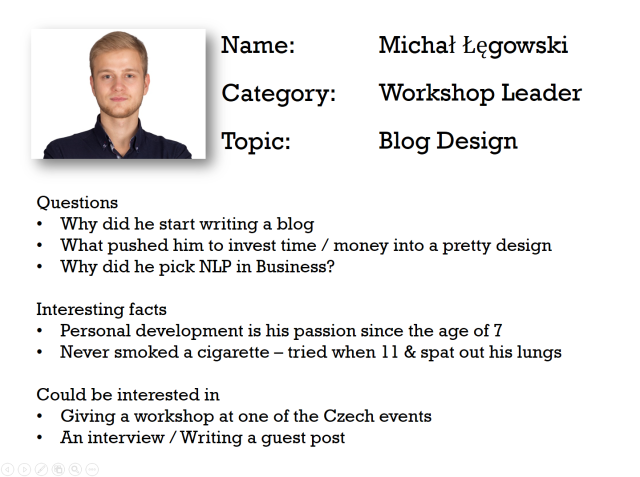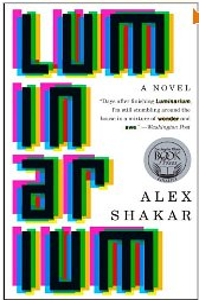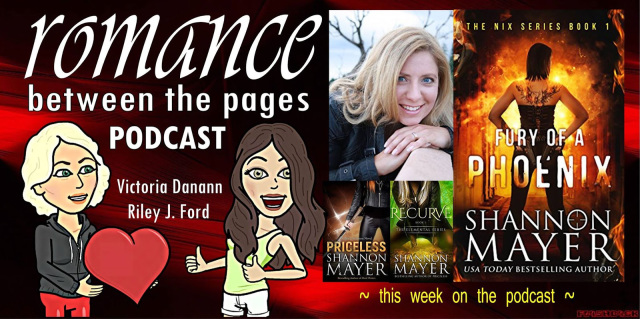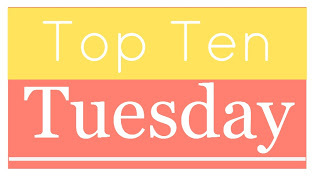“People are either bowling balls or pins at a conference. If you’re the ball, you walk (or roll) into a conference, an event, or an organization, and you blow it apart. With a dash of bravado and ingenuity, you leave a positive impression in your wake, create friendships and achieve the goals on your agenda. The pins sit placidly by, waiting for something, anything, to happen to them.”
– words of software executive Paul Reddy as captured in Keith Ferrazzi’s book Never Eat Alone
Having attended 2 Toastmasters conferences in the past two weekends – and planning to attend two more in the following two, I thought I might as well review the rules as how to get the most out of those events.
And while I’m at it: Why not share with you?
All the hints are coming from the chapter Be a Conference Commando the book Never Eat Alone mentioned above. If you’re more curious about the topic of how to build business relationships: Go & get it. $20 well spent.
While valid for any type of conference, I’ll use examples from the Toastmasters world.
There are two ways how you can approach attending a Toastmasters conference.
Approach #1: Holidays (money and time spent)
Travel a bit, spend time with your pals in a rented AirBnB flat, get entertained or inspired in the contests, learn a thing or two in the workshops. Taste a local meal or two, get drunk in the bar or / and at the galadinner.
If you’re up for this – you don’t need to extend any effort in order to get what you’re after. Just go and you’ll get it.
Approach #2: Work (money and time invested)
Here it gets more complicated. Thinking of the time as an investment, the first thing that you’ve got to clarify for yourself is: What do you want to get out of the conference? What are the returns you’re expecting?
As for the entertainment from the contests: You can get that by watching YouTube videos. As for the knowledge gained in the workshops: You can learn most of these things from books. As for renting an AirBnB flat with your friends – well, you don’t need a conference for that!
There is however one thing that you get at a conference and nowhere else: The concentration of people who are engaged in the same thing as you are. And while meeting them – it’s your choice whether to be the pin or the bowling ball. The first step towards becoming a bowling ball is to know what you want to get in the first place.
As for me – in a Toastmasters conference, I’m on a mission to find people who may be interested in:
- Coming to Czech&Slovakia as speakers in our conferences (like Antonio Meza, Julita Davies or… the secret keynote speaker for our April Division conference)
- Having me as a speaker in their conferences (I just came back from Toastmasters Leadership Institute in Leipzig today and went to Efekt Toastmasters conference in Biesko-Biała the weekend before, both on direct invites by the organizers whom I met in other conferences)
- Working with me in some other way (mentors, partners for interviews or guest posts)
Your goals for making connections at a conference may be different, and that’s fine. What is important is that you are aware of those goals before going. That way – you know where to focus your efforts.
The next thing to take into consideration is that some people are more in demand than others. Not surprisingly, often the more interesting people are more in demand, therefore have less time and interest to connect with you.
What this means is: Maybe you should take your fate into your own hands and take conscious steps towards increasing your own value as a person to connect with.
How to increase your own value? Here are a few hints to give you an idea where to start!
1. Help the OrganizerIt smells like work. In fact it is work. When I was helping to organize the 2014 Spring Division Conference in Prague, I missed a full hour workshop led by the main star of the event, a seven-times District Winner in speeches and evaluations, because I had to sit at the registration desk.
But exactly because I helped with the organization, I had this District Winner guy couchsurfing in my place. I had a chance to spend with him more than three hours on the way home, during dinner, breakfast, etc. – all that time listening to his tips how to become a better speaker.
Helping the organizers will most probably get you:
- Instant friends among the organizers (it does not happen that often that a participant would just freely offer their help)
- Useful information (e.g. which speaker will be tired after the long party or whether there will be enough coffee in the coffee breaks)
- Role that might make you interesting in the eyes of the others (“Are you the guy who has the lunch tickets? I just lost mine. Can you help me?”)
If you were to name three people whom you remember from the last event you attended – by any chance, would any of them be one of the speakers in that event?
When you’re the speaker, your value goes through the roof. Your name is on the agenda (you’re famous!) and people who are interested in your topic will come to your presentation. There is no better conversation starter as a workshop that you lead on a topic of your choice and on your terms.
Not sure how to prepare a useful presentation? Try a workshop. Here’s how you can start preparing it.
I apply to be a speaker at every event I attend. And even though networking was always the primary goal, as a side effect, it has helped to expand my repertoire of workshops and knowledge in the subjects I was speaking on.
3. Buy when the stock is cheapA hint for a situation when YOU want to start a conversation with SOMEONE ELSE who is a speaker.
The speakers in a conference usually have a lot to say about their subject. Believe me or not – they are the same people BEFORE they give their talk and AFTER they deliver it.
However: AFTER they speak, if their talk does not suck really bad, they instantly become micro-celebrities. Suddenly it’s way harder to get their attention, because you’re competing with all the other attendees who saw them speak.
Hence: If you want to connect with a speaker, do it BEFORE they speak. Yes, this means you should look at the agenda before the conference starts and decide who you want to talk to!
4. Be an information hubIs the next speaker supposed to be any good? How can I find the best souvenir place in town? Where is the afterparty?
If you know these things in a conference, you’re my friend – and you’ve got my attention! And of everyone else’s you meet during the coffee break.
5. Become a reporterHow to make people remember you after the conference ends? How about a small write-up of the whole event, your opinion on the organization, lessons you took from all the workshops you attended?
I’m usually doing a summary of a presentation I delivered and ask the organizers to distribute it with the post-event email to the attendees. Or I just post it to the conference Facebook event. Then even those who missed my workshop can have a look.
6. Know your targetsHave I said before that you don’t need to leave “Meeting with outstanding individuals” to chance? Maybe you know which outstanding individuals are coming to your conference – and you can do a bit of pre-planning. If you, by any chance, bump into them – what will you talk about? Would it help if you checked on what they’re interested in?
With Google, YouTube and LinkedIn at work: It’s easy to do your homework!

Example: Research Card on Michał Łęgowski; Lublin 2015
7. And finally: Follow-up!Remember – it’s not over when you get that business card or write the email address into your notebook. Get back in touch. What was it you wanted to do together? Maybe you wanted to ask for a bit of coaching over Skype? Invite them to give a presentation at your own conference? Maybe you have a tip for a book that person could be interested in?
When attending a conference, I always keep my black book (a pocket-sized journal) close. I write the names of the people to whom I speak – while I speak to them. If there is something in the discussion that deserves a follow-up: I write it down. Then, after I come back home and unpack my things – I sit down at my computer, open my Black Book and start writing emails. This way I can be sure nobody gets forgotten.
Bottom line: Be preparedIf you take the money and time spent for going to a conference as an investment – these hints will help you increase your ROI (Return on Investment).
A conference is a place where you can meet people who will change your life. Now it’s time to start increasing your chances.
Featured Image taken from unsplash.com, used under Creative Commons Zero.
Advertisements Share this:




